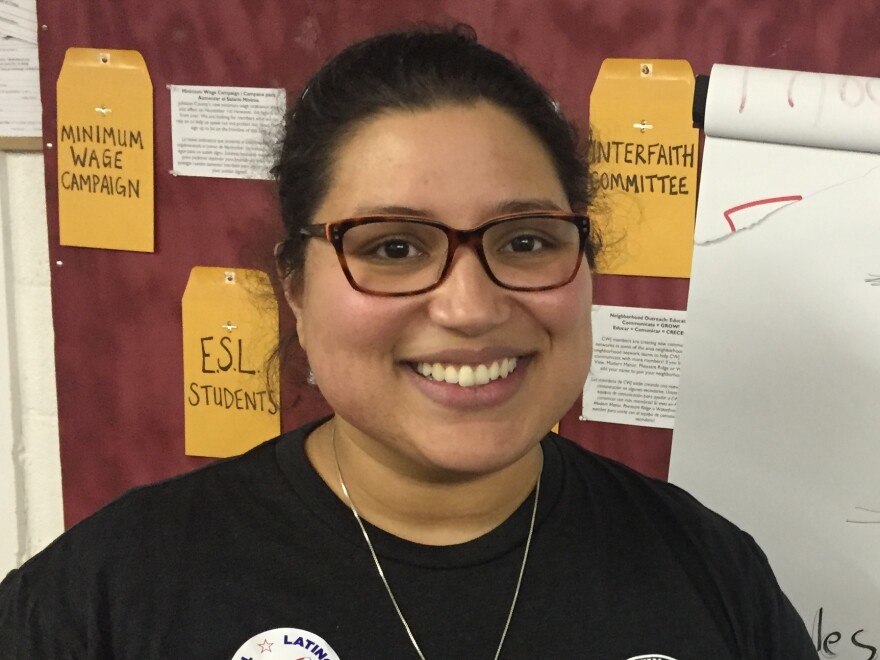When you think of Iowa, you probably think — lots of white people. And, that's true, but the state is also home to a growing number of Latinos.
Hispanics now make up 5.6 percent of the state's population, according to 2014 estimates from the Census Bureau. To put that in perspective, that means the Hispanic community in Iowa these days is twice the size it was during the 2000 caucuses.
And, this year, for the first time, Latinos in Iowa are trying to systematically organize themselves to caucus.
It's a challenge.
The League of United Latin American Citizens, also known as LULAC, has a goal of trying to persuade at least 10,000 Latino Iowans to caucus. The group estimates just about 1,000 participated in 2012.
And, so LULAC members have been knocking on doors, handing out flyers, and organizing training sessions.
"We want to bring out all the Latino voters, as many as possible; we want to flex our political muscle" explained Maria Bribiesco, LULAC's deputy state director.
Bribiesco was speaking at a caucus training in Iowa City where a couple dozen Latinos had gathered to learn the system. They were participating in a mock caucus — presidential candidates were replaced by bean dishes from Mexico, Puerto Rico and Colombia.
The goal of the mock caucus was to make an arcane system relatable to new people, like Manuel Galvez, who moved to Iowa 11 years ago from Mexico, but has never caucused before.

"In the past, there were just few Latinos in Iowa," Galvez said.
But, now, he says Latinos have the numbers to send a message ... if they get involved.
"The Latinos they don't participate. Nobody pay attention to them - no Democratic party, no Republican party," said Galvez. "We believe we can be heard if we mobilize ourselves."
And, so he plans to caucus for the first time on February 1.
Part of the challenge in mobilizing Iowa's Latinos is that they are incredibly diverse - there are families that immigrated from Mexico generations ago, new immigrants moving for blue-collar jobs, and second-generation millennials coming from other states, like Vitalina Nova, 30, who moved to Iowa in September to work as a librarian at the University of Iowa.

"When I found out that there are majority-minority towns in Iowa, I thought that's really unique - how are they being represented?" asked Nova, who grew up in Boston. "And, how come it seems to me that a lot of the white population doesn't know about this."
One of those majority-minority town is West Liberty in eastern Iowa. It's part of Muscatine County — where the Latino population essentially mirrors the country's demographics – comprising 17.2 percent of the population. (In the country as a whole, Latinos make up 17.4 percent of the population.)
But, numbers don't equal political power. And, despite the changing demographics in Muscatine County, there are many Latinos like Karina Beltran.
Beltran says she has voted in previous presidential elections, and she would be open to caucusing, but she doesn't know how it works or where to go.
"I haven't heard anything about political caucus or whatever," she said.
Talking to some folks in Muscatine County, you realize how difficult it may be to get 10,000 Latinos to participate on Feb. 1.
Down the road at a Mexican restaurant, Yaridia Sosa says she's familiar with the word, "caucus," but doesn't know much beyond that.
And, even if someone explained the process to her, she's skeptical she would go because it's a multi-hour time commitment on a Monday evening.
"I work here all day, so I don't have any time to go, I don't have no one to cover for me," she adds.
Sosa says she's not very political, but then, in passing, she mentions that her college daughter was going to see Hillary Clinton speak in person.
That mother-daughter generational divide may be a sign.
Because regardless of whether 10,000 Latinos caucus on February 1, the Hispanic community in Iowa is young, which suggests numerically Latinos will likely be a force in campaigns to come.
Copyright 2021 NPR. To see more, visit https://www.npr.org.



